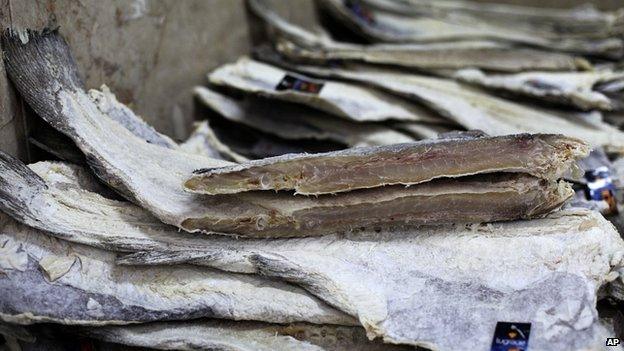Europe fish stocks 'heading for recovery', study claims
- Published

Cod remains vulnerable, but the authors say other stocks show signs of bouncing back
Many European fish stocks are on the road to recovery from overfishing, according to a major new study.
Findings from an international effort to assess the status of dozens of fish stocks are published in the journal Current Biology, external.
The research found that many stocks in the northeast Atlantic were being fished sustainably and, given time, should recover.
But one researcher said that any talk of a recovery would be "premature".
Paul Fernandes and Robin Cook examined the status of 57 stocks monitored over 60 years in the northeast Atlantic.
They used data collected largely by government research institutes, including large programs at hundreds of fish markets and at sea on hundreds of fishing and research vessels operating every day of the year.
They found that over the last decade there had been substantial reductions in the exploitation of these populations, and this coincided with improvements in their status.
The European Union's Common Fisheries Policy (CFP) has come in for sustained criticism for failing to protect fish stocks, external. The authors, though, say their results provide no support for a view that the CFP has failed.
They were surprised by the number of stocks that have improved since fishing pressure was reduced at the turn of the century. In 2011, for the first time, they say, the majority of fish stocks were being fished sustainably - the result of reforms put in place in 2002.
"Contrary to common perception, the status of our fish stocks is improving," said co-author Dr Paul Fernandes from the University of Aberdeen, UK.
"Many of our stocks are not overfished; nature now needs to take its course for these fish to rebuild their populations."
However, the status of some stocks - particularly cod - remains precarious.
Timescale required
Dr Callum Roberts, a fisheries expert who was not involved with the study, told BBC News: "Reports of recovery are premature."
Dr Roberts, from the University of York, UK, added: "There is an improvement in some of the indicators, and that is good news. But what is monitored is only a small fraction of what is exploited - albeit it is among the more commercially [relevant] species that are being monitored."
At the 2002 World Summit on Sustainable Development, politicians committed to re-build fish stocks to maximum sustainable yield (MSY) levels by 2015. The MSY describes the largest catch that can be taken from a fish stock over an indefinite period without harming it.
"As time went on, it became more and more apparent that there was no way they could re-build stocks to those levels by that target year," said Dr Roberts, "So a less ambitious target was adopted, which is that fishing mortality rates need to be brought down by 2015 to a point where fish stocks can be re-built to MSY levels by some future date.
"That is the main essence of this paper - for a lot of stocks we have reduced fishing mortality rates to a level that will deliver MSY levels eventually. But there's no set timescale over which you have to do it... Some of the fishing mortality rates are not going to deliver recovery of the fish stocks any time soon."
Co-author Dr Robin Cook told BBC News: "Many of the stocks are above what is regarded as the minimum safe level of biomass.
"There are some stocks where you would have some concerns. Some of the cod stocks have not recovered particularly strongly.
"In the last few decades there has been some success at reducing fleet size and the number of days that vessels fish for. But that has to stay that way - if you don't do that things will just deteriorate to where they were in the past.
"Having got to where we are, we don't want to just take the brakes off and expand again."
This year has seen marathon negotiations to reform the Common Fisheries Policy, including an agreement to phase out "discards" - the controversial practice of dumping unwanted fish.
Paul.Rincon-INTERNET@bbc.co.uk and follow me on Twitter, external
- Published31 May 2013
- Published6 February 2013
- Published6 February 2013
- Published25 February 2013